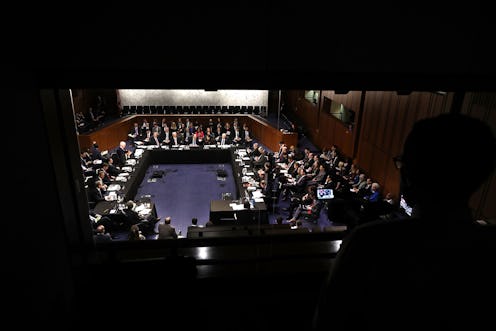News
Will There Be A Government Shutdown Again?

The partisan divide in Congress often seems like more entertainment than politics, but next week, Capitol Hill could face one of the most serious consequences of its partisanship. The federal government might shut down next week if Congress can't come together to agree on a budget, and it increasingly looks like that might not happen. With the deadline drawing closer and no end to the ideological debates in sight, the federal government could be in trouble in more ways than one.
The possibility of a government shutdown typically draws a lot of media attention, and some have come to fruition over the years. Shutdowns occur for a few reasons, but the root of the problem is always money, and which department or initiative it should be spent on. In this instance, Congress has been passing short-term spending bills for the last few months, because the debates on appropriations are so fundamental to each party's central tenets that there hasn't been enough movement on either side to find a long-term solution.
In September, Congress narrowly avoided a shutdown by funding the government until December — the debate that time centered on federal funding for Flint and Zika relief, both of which congressional Republicans opposed on an ideological basis. When the clock was almost up again in December, Congress passed another bill to keep the government running until this month.
The upcoming deadline for Congress to ensure appropriations for the federal government is next Friday, April 28, and if President Donald Trump doesn't sign a budget by 11:59 p.m. that day, the government will grind to a halt. All non-essential federal employees will have to stop showing up to work (and thus stop getting paid), national parks and federally funded museums like the Smithsonian will be closed, and people won't be able to access other government services, like post offices.
Whereas during the last government shutdown in 2013, when Congressional Republicans refused to pass President Obama's proposed budget without compromising cutbacks to Obamacare, the tables have now turned. This time, the Democrats are refusing to bend to the administration's demands, which include a "down payment on a border wall and hiring of additional immigration agents," according to the Associated Press.
Office of Management and Budget director Mick Mulvaney criticized the left for their continued resistance to the administration, but just like Republicans three years ago, Democrats are now caught between two undesirable political scenarios — letting the government shut down, or helping Trump accomplish some of his most divisive campaign promises.
"We know there are a lot of people on the Hill, especially in the Democratic Party, who don’t like the wall, but they lost the election," Mulvaney told the AP. "And the president should, I think, at least have the opportunity to fund one of his highest priorities in the first funding bill under his administration."
That might be true under another presidency, but Trump doesn't have the popularity to force Congress to achieve those policy goals. He's about to end the first 100 days of his presidency with historically low approval ratings, which isn't an incentive for any Congressional representative, Democrat or Republican, to play along with his agenda just because. The potential shutdown could be a chance for the Democrats to flex their power in Congress, and may well turn out to be their most effective bargaining tool against Trump's policies.